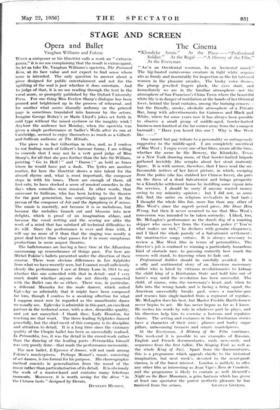Vaughan Williams and Fokine
STAGE AND SCREEN Opera and Ballet
Wimtv a composer or his librettist calls a work an extrava- ganza," it is no use complaining that the result is extravagant.
So let us take Dr. Vaughan Williams's operetta, The Poisoned Kiss, at its face value and not expect to find sense where none is intended. The only question to answer about a
piece designed for public entertainment and not for the
uplifting of the soul is just whether it does entertain. And to judge of that, it is no use reading through the text in the vocal score, so promptly published by the Oxford University Press. For one thing Miss Evelyn Sharp's dialogue has been pruned and brightened up in the process of rehearsal, and for another what seems dismally unfunny on the printed page is sometimes translated into humour by the actors. Imagine George Robey's or Marie Lloyd's jokes set forth in cold type without the raised eyebrow or the naughty wink Anyhow the audience last Monday, when the operetta was given a single performance at Sadler's Wells after its run at Cambridge, seemed to enjoy themselves as much as a Gilbert- and-Sullivan audience at The Mikado.
The piece is in fact Gilbertian in idea, and, as I confess to not finding much of Gilbert's humour funny, I am willing to concede that I may not be a very good judge of Miss Sharp's, for all that she goes further than the late Sir William, printing " Go to Hell ! " and " Damn ! " as bold as brass where he would have put a dash. The lyrics are another matter, for here the librettist shows a nice talent for the absurd rhyme and, what is most important, the composer steps in with his tunes. There are enough of them, all first-rate, to have stocked a score of musical comedies in the days when comedies were musical. In other words, that successor to Sullivan, who has been lacking to the theatre for the past generation, has surprisingly appeared in the person of the composer of Job and the Symphony in F minor. The music is masterly, not because it is so melodious, but because the melodies branch out and blossom into new delights, which is proof of an imagination ablaze, and because the vocal writing and the scoring are alike the work of a mind that has subdued all technical difficulties to its will. Since the performance is over and done with, I will say no more of it than that the singing was mostly a great deal better than what passes for it in more sumptuous productions in more august theatres.
The balletomanes are having a busy time at the Alhambra summoning up remembrance of things past. For here are Michel Fokine's ballets presented under the direction of their creator. There were obvious differences in Les Sylphides from what we have recently seen, but I cannot recall sufficiently clearly the performance I saw at Drury Lane in 1914 to say whether this one coincided with that in detail—and I very nitwit doubt whether anyone else not directly connected with the Ballet can do so either. There was, in particular, a. different Mazurka for the male dancer, which suited Eglevsky so admirably that it might have been composed for him, though I confess to a sneaking affection for what I suppose must now be regarded as the unauthentic dance we usually see. Eglevsky is admirable in this part, an excellent partner in the technical sense, with a slow, dreamlike quality, and yet not nancyfied—I thank thee, Lady Houston, for teaching me that word. The three leading Sylphides danced gracefully, but the chief merit of this company is its discipline and attention to detail. It is a long time since the visionary quality of the Chopin ballet has been so successfully realised. In Pelrouchka, too, it was the detail in the crowd-work rather than the dancing of the leading parts—Petrouchka himself was very poorly done—that made the performance memorable. The new ballet, L'Epreuve d'Amour, will not rank among Fokine's masterpieces. Perhaps Mozart's music, consisting or set dances, is too formal for his purpose. His choreographic method consists in generalisation from the mood of the music rather than particularisation of its detail. It is obviously the work of a master-hand and contains many felicitous moments. Moreover, it is worth seeing for the decor " in the Chinese taste " designed by Derain.
DYNELEY HUSSEY.


















































 Previous page
Previous page